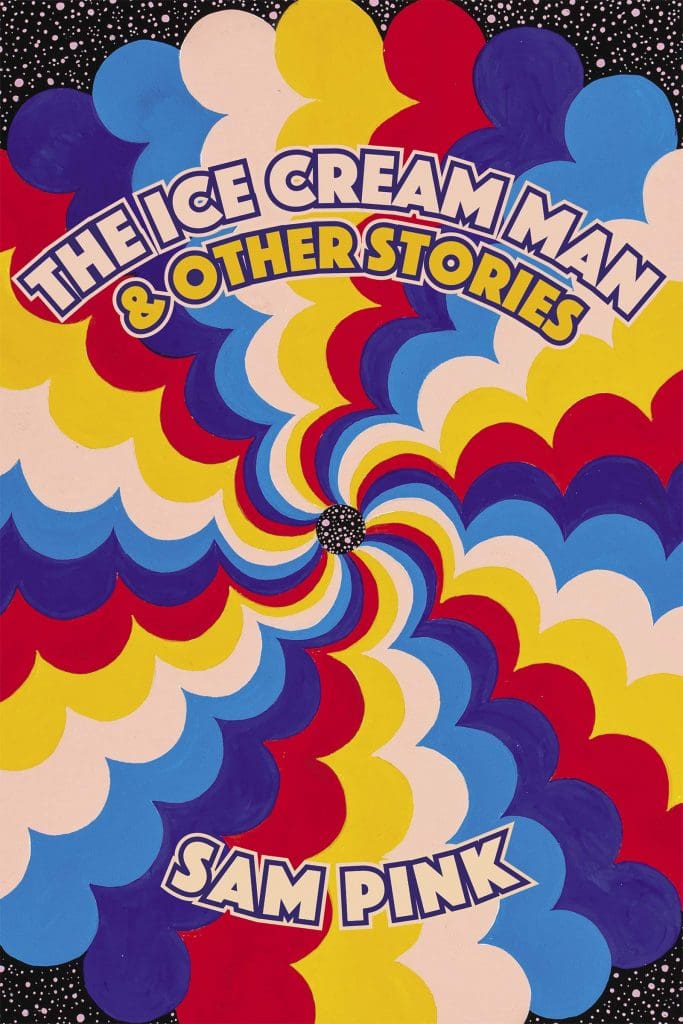Literature is full of characters who experience reversals of fortune or claw their way to the top; Sam Pink does not write about those people. His latest collection, The Ice Cream Man and Other Stories (268 pages; Soft Skull), is comprised of stories about the individuals who wash the dishes at your favorite restaurant, set the plates at your wedding, and yes, drive the ice cream truck through your neighborhood. In Pink’s writing style, words cascade down the page as he creates a line break after every sentence. The ample white space means it’s never long before the reader is turning the page, creating a momentum often at odds with his story’s protagonists, who are stuck watching the clock, enduring every agonizing minute until the end of their shift. “The Sandwich Maker” requires little context beyond its title:
The sandwich makers stand there, making the same six sandwiches, sometimes with extra whatever, or no whatever, or a side of whatever, or whatever whatever.
Sandwich after sandwich.
Toasting bread, throwing ingredients into the bowl, laying cold cuts, spraying on condiments, assembling, cutting, wrapping, staring off, drying.
The same process.
Different ingredients.
No end.
Millions of Americans work jobs like this, though you’d hardly know it from most of the stories we consume, whether through books or film. Pink’s writing captures the flared tempers, the petty grievances, and employee solidarity of the 9 to 5—but most of all he skillfully conveys the toil.
The collection, culled from stories Pink wrote between 2014 and 2019, is divided into three sections based on geographical setting: Chicago, Florida, and Michigan. “Blue Victoria” proves a highlight of the Chicago portion; it’s one of the rare pieces that doesn’t occur in the workplace, but rather provides an intimate look at a group of friends who fracture under pressure when one of their own, Chris, begins engaging in increasingly erratic and illegal behavior during their nights out, as when he smashes a credit card terminal with a brick. Drugs and alcohol certainly play a role in Chris’ mental breakdown, but so do the pressures of paying rent and maintaining relationships in a city, especially one as bitterly cold as Chicago:
When winter came, we were inside more.
Nothing but small golden Christmas lights and snow and gray outside.
Freezing temperatures.
Nothing to do.
And Chris was unbearable.
Robby was right.
Something about him had changed.
I’d never really liked him.
But this was different.
He broke up with Victoria.
Got jumped and beaten by some gangbangers for talking shit while drunk.
Doing more coke.
Always broke.
Pink’s writing is made increasingly palatable by the very same thing used to get through the tedium of the working day: humor. Each of these stories is buoyed by Pink’s off-kilter sensibility and comedic nonsequiters (“a dog so small I thought it was a chipmunk at first” is a not atypical description). At the same time, The Ice Cream Man possesses a caustic sadness and world-weariness that often spring from unexpected directions in the stories. There’s no denying these characters are performing work that, while necessary, is severely under-valued, a fact that can weigh heavily. One of the most relatable moments comes in “The Stag,” after the narrator and his co-worker Summer have just completed serving an hours-long wedding reception: “Summer says she just wants to take off her shoes. Says that’s all she thinks about. Not food, booze, drugs, sex, none of that, just taking her shoes off. Yeah.”
At the same time, this variety of work—this toil—often brings with it a particular kind of mindfulness. These characters aren’t concerned with “seizing the day” or “living life to the fullest” or any other hackneyed aphorism of self-help culture; they’re too busy trying to pay their bills. But the long hours on their feet, making sandwiches or serving chicken platters to ungrateful wedding guests, mean they have the capacity to savor those rare moments of workaday serenity: the last sparklers fading behind departing revelers on a balmy summer night, or a brilliant stag glimpsed in the woods behind a rundown apartment complex. Such moments are here and gone, but that is part of the beauty, too, when your eyes are open.

